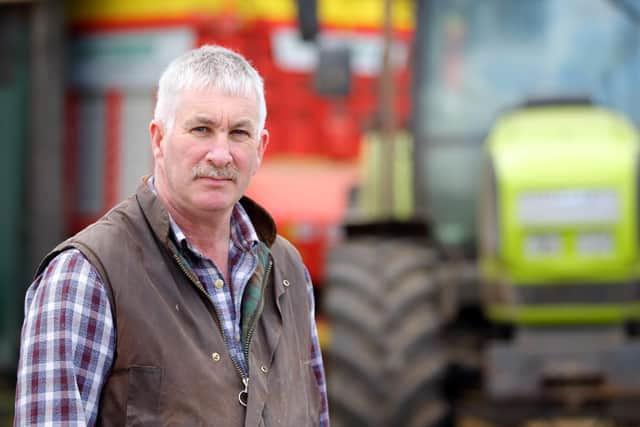bTB showdown was inevitable


During the discussion, union members were very open about their dissatisfaction regarding the extent of DAERA’s inaction on bovine TB (bTB).
UFU president Victor Chestnutt said: “Feelings ran very high amongst our members as they got the opportunity to directly engage with Robert Huey.
Advertisement
Advertisement
“It’s always extremely difficult to listen to a farmer expressing their anguish about the level of distress the disease is causing them, affecting their mental health and creating financial implications that impact the entire family.


“To have our executive members on one meeting venting the same frustration caused by DAERA’s inaction of TB, takes it to another level.
“Yet it’s only a snippet of what farmers across NI are still experiencing years after we were told a TB strategy was almost ready.
“The threat of removing a proportion of direct support for not TB testing is nothing short of a ‘choke chain’ around our members’ necks.
Advertisement
Advertisement
“During the earlier stages of the coronavirus pandemic, DAERA relaxed this warning and we demanded that going forward, this relaxation continues. DAERA have plenty of other tools in the box without threatening farmers’ direct support which is vital to sustain their family farm businesses.
“The threat of removing a proportion of direct support for not TB testing is nothing short of a ‘choke chain’ around our members’ necks. During the earlier stages of the coronavirus pandemic, DAERA relaxed this warning and we demanded that going forward, this relaxation continues. DAERA have plenty of other tools in the box without threatening farmers’ direct support which is vital to sustain their family farm businesses.
Mr Chestnutt added: “Mr Huey confirmed that the threat of reducing Basic Payment Scheme entitlements will be reviewed and assurances were given to improve communication with farmers after our executive made it clear that DAERA’s poor communication was creating extra stress.
“The union has never agreed that DAERA should have the power to use basic payment penalties as a weapon to ensure that a bTB test is carried out.
Advertisement
Advertisement
“This is a totally disproportionate measure. The union fully backs the need for all bTB tests to be carried out. But DAERA already has all the tools in the box to ensure this happens. The powers to ban all sales of cattle from a farm business while a bTB test is being sorted out re more than sufficient in this regard.”
The UFU executive committee also stated that the word “compensation” needs to be removed as this is stock value and they would like DAERA to explore the compensation system in the Republic of Ireland where farmers are covered for loss of earnings during any major outbreak.
According to Mr Chestnutt milk producers in the Republic of Ireland receive stock value plus a payment of €55 or month for every dairy cow taken.
The equivalent figures for suckler cows and other cattle are: €35 and €20 - €25 per month. These payments kick-in subsequent to 10% of a farmer’s herd being culled in the wake of a bTB test.
Advertisement
Advertisement
The union president also wants DAERA vets to be empowered to talk directly to farmers that are struggling with a bTB challenge.
He said: “The Executive meeting highlighted the stress that farmers locked up with bTB are under. Given this reality, it is only right that they should be allowed to talk directly with DAERA vets regarding the problems they are confronting.”
Mr Chestnutt also confirmed that tackling the reservoir of bTB in wildlife is the other side of the eradication equation.
He further explained: “This must be part of the bTB strategy put in place by DAERA moving forward. The union has already agreed with the principle that farmers will pay for a wildlife intervention strategy courtesy of a levy on milk and cattle sales.
Advertisement
Advertisement
“This approach has already been taken in the Republic of Ireland, where the number of bTB reactors fell from 40,000 to 15,000 per annum within a three-year period.”
He concluded: “In October, Mr Huey is due to touch base with the executive again and should DAERA fall short of their commitments including a promise of wildlife intervention, that will be the end of farmer co-operation with their veterinary service. Our members have reached breaking point.”